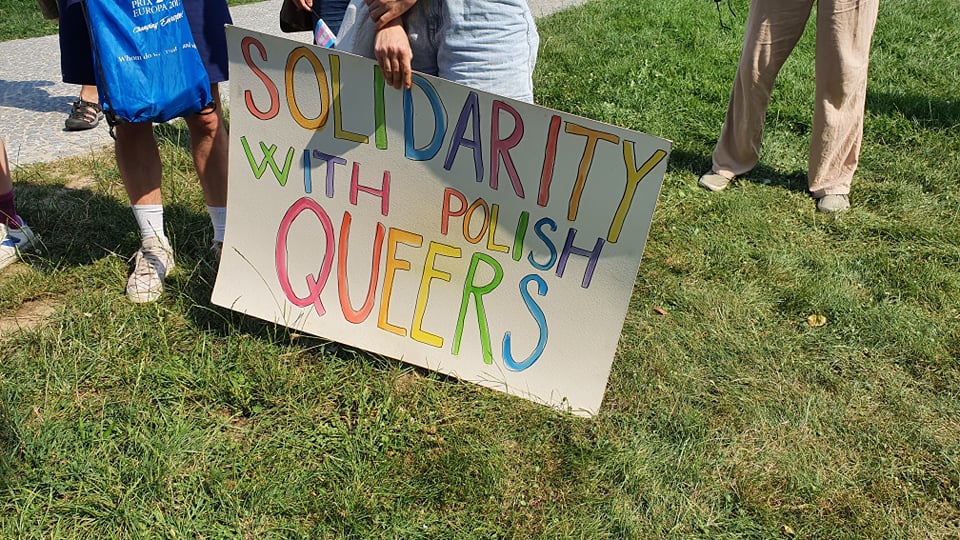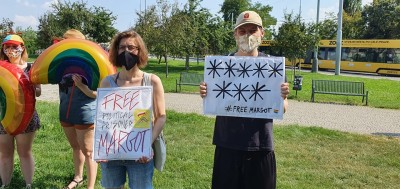In 2020, Prague Pride festival was supposed to celebrate its 10th year of existence. When COVID-19 stroke, the festival team was working hard on the program, booking international guests and signing partnerships with sponsors.
As news about the cancellation of the world Pride events started coming, the Prague Pride team decided to hold the event as originally scheduled in August, and despite obstacles provide Czech LGBT+ people with a chance to enjoy a week of solidarity, support, and expressing their true selves.
However, the festival program had to be adjusted to a new situation and, basically, reformatted.
COVID-19 only further underlined the 2020 Prague Pride theme, which was Interconnection. Originally, it was selected to stress the importance of cooperation among LGBT+ organizations on a national level and to point out the role the Prague Pride Association had played in establishing collaborations and partnerships during the 10 years of existence.
With COVID-19 lockdown, a new perspective of interconnecting LGBT+ people around the Czech Republic and worldwide through Pride online stream has emerged.
Being aware of how strong and effective building coalitions is, the festival team decided to invite other Pride organizers from V4 and South-East European countries to meet and share experience and to establish new contacts. The networking initiative was supported by the Friedrich Naumann Foundation for Freedom.
Due to the lockdown, meeting in person was impossible and so the planned events were held online. The program included an internal networking meeting and a debate titled “When Pride Is Life-Threatening“, which was broadcasted through the Pride Stream (from 1:06:30).
The Pride organizers from eight countries joined the internal online meeting. Many of them were then in a situation of uncertainty regarding the date of their Pride march, financial resources, and further development of the pandemics in their country.
Warsaw and Bialystok Prides from Poland had their Pride Marches cancelled due to COVID-19. Budapest, Zagreb, Sarajevo, and Ljubljana Prides postponed their marches to later dates. Prague, Ostrava (Czechia), and Košice (Slovakia) were keeping their original dates. Banská Bystrica (Slovakia) had already had their march with 120 participants in June, whereas Sofia (Bulgaria) held a digital Pride.
In the debate that lasted one and half hours, several issues that are common for all participating Prides came up. The first is deteriorating political climate with far-right parties getting votes and even seats in the government.
Countries such as Poland, Hungary, Slovenia, the Czech Republic are experiencing turn of their political representation against EU and anti-LGBT attitudes go hand in hand. LGBT+ and Romani people are used to serve as common enemies in political campaigns.
The coronavirus pandemic is another big challenge for the Pride organizations, because it is not possible to hold events. Meanwhile, sponsors are pulling out due to uncertain economic future.
LGBT+ people – especially those living under oppressing and in stressful environment created by the political power in their countries – and their families have a great need for meeting their folks and keeping contact with LGBT+ community.
This was proved, for example, by a questionnaire assessing the needs of LGBT+ persons in Croatia, according to which the majority of respondents called for free psychological help. COVID-19 has also become a handy tool for authorities to restrict or ban Pride Marches, events for LGBT+ audience, or political protests.
In addition, the Pride organizers face specific local issues in their countries. In Hungary, it was a fight against a ban on legal gender recognition that the Budapest Pride team was engaged in at the time when they were supposed to work on the festival preparations.
Bulgaria had a fierce public argument regarding the Istanbul Convention that was used to discredit LGBT+ people and push them into invisibility.
Polish Prides bore the consequences of presidential election campaign – foreign embassies did not even write a letter of support this year in order not to influence the election. The campaign was hateful, with President Andrzej Duda calling LGBT+ people “not human” and “second-class citizens”.
The Pride team in Sarajevo (Bosnia and Herzegovina) has to take into account bad public health system and make only steps that will not make the situation even worse. However, the country is in a process of the EU integration, which prevents far-right politicians from coming forward with their anti-LGBT+ claims.
Good news came from Croatia, which had been enjoying a pro-EU government that is not supportive towards LGBT+ issues (but not hostile either) since July. Original fear that Croatia would join the Budapest–Warsaw–Ljubljana club did not come true.
It has been a month since the online networking meeting took place and important developments unwind in each country every day. Bulgaria has been witnessing mass protests against the government. Poland’s bishops issued an official declaration of their attitude towards LGBT+ people calling for opening church clinics. These issues never stand alone and many of them appear in one country after another.
Therefore, keeping touch and sharing experiences is so valuable for LGBT+ activists from V4 and South-East European countries, where socio-political climate is similar in many ways. Prague Pride festival is ready to organize a similar meeting again. Let us all hope it will be possible to meet in person.
Continue exploring:
Importance of Human Relations during Pandemic: Lessons Friends TV Series Thaught Us
“Thou Shall Not Be Indifferent”: What Holocaust Survivors Can Tell Us about Poland’s LGBT-Free Zones




